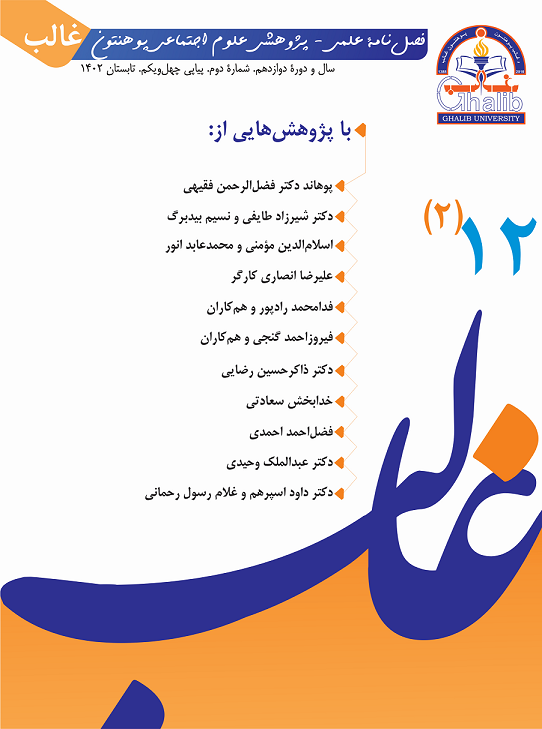Timelessness of Mythical - Archetype in Forogh_e_Farrokhzad's Poems
DOI:
https://doi.org/10.58342/ghalibqj.V.12.I2.2Keywords:
Critique of Archetypal Myth, Time, Timelessness, Forogh FarrokhzadAbstract
In today's world, the critique of mythology-archaeology as one of the research approaches in human sciences has been noticed by the thinkers of knowledge field. Time is one of the mythological archetypes, which has been widely reflected in literary texts, and in connection with this archetype in mythological analysis, we encounter something called timelessness. Timelessness refers to things that happen out of history; this means that issues that are not recorded in any history books; but is always influential in human life and thought. By examining Forogh Farrokhzad's poetry, we found out that he consciously and unconsciously included the apprehension and passing of time in his poetry; and then, from posing the question and stating the hypotheses of the research, as well as introducing research works similar to this thesis, we discussed the theoretical foundations related to the topic of analysis, and then, according to the theoretical foundations, we analyzed the poems that used the old language of time with the concept of timelessness, and we reached the conclusion that Farrokhzad, with a simple language, has introduced the deep concepts into his poetry, and his searching mind always seeks to go beyond the conventions. In this research, we used the theories of mythologists such as Levi Strauss, Mircea Eliade, and Carl Gustav Jung. The working method in this research is descriptive-analytical and it has been tried to analyze the concepts and words related to mythological-archaic timelessness in Forogh Farrokhzad's poems.
References
آرمسترانگ، کارن. (1390). تاریخ مختصر اسطوره. ترجمۀ عباس مخبر. چ پنجم. تهران: مرکز.
الیاده، میرچا. (1389 الف). رسالهیی در تاریخ ادیان. ترجمۀ جلال ستاری. چ چهارم. تهران: سروش.
الیاده، میرچا. (1384 ب). اسطورة بازگشت جاودانه. ترجمة بهمن سرکاراتی. تهران: قطره.
الیاده، میرچا. (1375 پ). اسطوره، رؤیا، راز. ترجمۀ رؤیا منجم. چ دوم. تهران: فکر روز.
آموزگار، ژاله. (1398). تاریخ اساطیری ایران. چ نوزدهم. تهران: سمت.
برسلر، چارلز. (1393). درآمدی بر نظریهها و روشهای نقد ادبی. ترجمۀ مصطفی عابدینیفرد. چ سوم. تهران: نیلوفر.
بهار، مهرداد. (1374). جُستاری چند در فرهنگ ایران. چ دوم. تهران: فکر روز.
دریابندری، نجف. (1399). افسانۀ اسطوره. چ سوم. تهران: کارنامه.
ریکور، پل. (1384). زمان و حکایت. ترجمۀ مهشید نونهالی. تهران: گام نو.
شایگان، داریوش. (1380). بُتهای ذهنی و خاطرۀ ازلی. چ چهارم. تهران: امیرکبیر.
شفیعیکدکنی، محمدرضا. (1390). با چراغ و آیینه (در جستوجوی ریشههای تحول شعر معاصرایران). تهران: سخن.
فرخزاد، فروغ. (1399). دیوان اشعار به همراه نگرشی بر زندهگی، احوال و آثار او. بهکوشش بهروز جلالی پندری. تهران: مروارید.
کاسیرر، ارنست. (1387). فلسفه صورتهای سمبلیک. ترجمۀ یدالله موقن. چ دوم. تهران: هرمس.
معروف، یحیی؛ نعمتی، فاروق. (1393). «بازتاب اسطورۀ سیزیف در شعر معاصر فارسی و عربی». ایران: نشریۀ ادبیات تطبیقی. دانشکدۀ ادبیات و علوم انسانی. دانشگاه شهید باهنر کرمان. سال ششم. شمارۀ 11. صص 295-316.
نامور مطلق، بهمن. (1397). درآمدی بر اسطورهشناسی، نظریهها و کاربردها. چ دوم. تهران: سخن.
References
Armstrong, Karen. (2011). A brief history of the myth. Translated by Abbas Mokhbar. P 5. Markaz: Tehran. (Persian)
Eliade, Mircha. (2010A). A treatise on the history of religions. Translated by Jalal Sattari. P 4. Tehran: Soroush. (Persian)
Eliade, Mircha. (2005B). The myth of eternal return. Translated by Bahman Sarkarati. Tehran: Ghatreh. (Persian)
Eliade, Mircha. (1996C). Myth, dream, secret. Translated by Roya Monajjem. P 2. Tehran: Fekr-e Rooz. (Persian)
Amoozegar, Jaleh. (2018). Mythological history of Iran. P 19. Tehran: Samt. (Persian)
Bressler, Charles. (2013). An introduction to the theories and methods of literary criticism. Translated by Mustafa Abedini Fard. P 3. Tehran: Niloofar. (Persian)
Bahar, Mehrdad. (1995). Some essays about Iranian culture. P 2. Tehran: Fekr-e Rooz. (Persian)
Daryabandari, Najaf. (2019). The legend of the myth. P 3. Tehran: Karnameh. (Persian)
Ricoeur, Paul. (2005). Time and story. Translated by Mahshid Nonahali. Tehran: Gam-e No. (Persian)
Shaygan, Dariush. (2001). Mental idols and eternal memory. P 4. Tehran: Amir Kabir. (Persian)
Shafei kadkani, Mohammadreza. (2011). With a light and a mirror (in search of the roots of the evolution of contemporary Iranian poetry). Tehran: Sokhan. (Persian)
Farrokhzad, Forough. (2019). Divan of poems along with an attitude on his life, condition and works. To be proud of Behrouz Jalali Pendri. Tehran: Morvarid. (Persian)
Cassirer, Ernst. (2008). Philosophy of symbolic forms. Translated by Yadullah Moqen. P 2. Tehran: Hermes. (Persian)
Marouf, Yahya; Nemati, Farooq. (2013). "Reflection of the myth of Sisyphus in contemporary Persian and Arabic poetry". Iran: Comparative Literature Journal. Faculty of Literature and Human Sciences. Kerman Shahid Bahonar University. sixth year Number 11. pp. 295-316. (Persian)
Namvar Motlaq, Bahman. (2017). An introduction to mythology, theories and applications. P 2. Tehran: Sokhan. (Persian)
Downloads
Published
How to Cite
Issue
Section
License
Copyright (c) 2023 Ghalib Journal

This work is licensed under a Creative Commons Attribution 4.0 International License.













